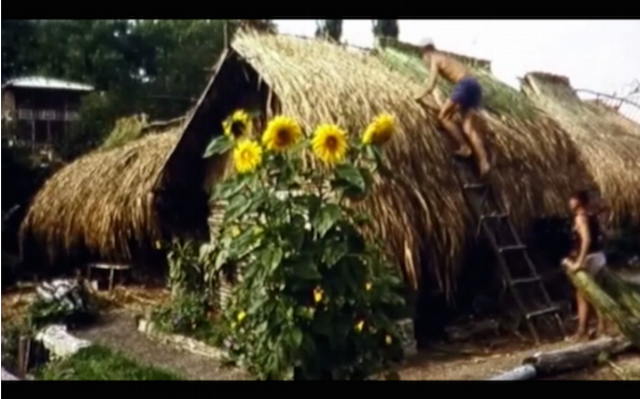Paris 8 University / Legacies and modalities of co-creation practices

- Screenshot, film still from an archive film (André Ferrer collection) from Maude Mandart’s research.
While co-creation based artistic practices that engage with the social field have been subject to a growing interest in Anglo-Saxon countries over the last 15 years, they have rarely been analyzed in France from critical, historical or theoretical perspectives until today, when they occupy a central place among these discourses. Among such practices, we would like to distinguish « creative participation » — or when « the visitor provides the content for an element of the artwork, within a structure established by the artist » (according to the definition suggested by Pablo Helguera in Education for Socially Engaged Art) from « collaborative participation », which interests us in the first place. The latter allows the collaborator to « share the responsibility for developing the structure and the content of an artwork, in collaboration and in direct dialogue with the artist » (Helguera).
« Collaborative participation » or co-creation necessitates an initial indecision — in the construction of the process, its goals or the modalities of encounter. Hesitating, allowing for discussions, confrontations and adjustments that are inherent to collective creation will stimulate the construction of relations as well as individual creativity. A set of questions regarding the production mechanisms of an artwork and its transmission thus arises. Co-creation generates a space of freedom that triggers a reflection on power relations and on the distinctions articulated between professionals and amateurs. It also allows us to acknowledge our political agency. Thus, we believe it is important to think about co-creation practices in relation to alternative pedagogies: in the South-American tradition initiated by Paolo Freire as well as in people’s education movements, they too aspire to be emancipatory tools, notably through cooperation. Lastly, we observe that such practices favor fragmented forms like ellipsis, montage, collage and/or assemblage. By making the place allocated to the other sensible, these processes highlight the heterogeneity of the collective, and allow the construction of multiple voices wherever these practices rely on orality.
The research program “Legacies and modalities of co-creation practices” began on December 5, 2015 with a study day at MAC VAL contemporary art museum in Vitry. We are now developing a series of invitations in the frame of the seminar “Experience and territory: collaborative artistic practices” organized by Marie Preston at Paris 8 University. This research is situated at the crossroads between artistic, sociological and anthropological fields, just like co-creation practices operate at the junction of various disciplines.
Research program initiated and run by Céline Poulin et Marie Preston, in collaboration with Stéphanie Airaud.
University Paris 8 Vincennes-Saint-Denis (Équipe Teamed). MAC VAL contemporary art museum in Vitry-sur-Seine. In partnership with Kadist Art Foundation and Villa Vassilieff.
See the detailed program and seminar dates in the article Events.
Partager